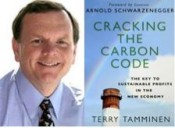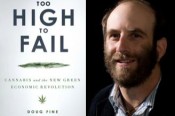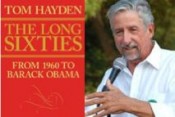Free Forum Q&A – TERRY TAMMINEN, frmr Secy Cal EPA CRACKING the CARBON CODE Sustainable Profits in the New Economy
Written on September 4th, 2013 |
Aired 09/02/12
When I first met TERRY TAMMINEN, he was living on a houseboat in the Marina and filling a position he’d founded as the first Santa Monica Baykeeper. No too long before that, he had been running a pool services company. And not too long after, he was Secretary of the California EPA.
Tamminen has reinvented himself successfully in several very different worlds — business, government, non-profit, foundation, from the grassroots to the halls of power. All of this for a long time now to achieve a sound and healthy relationship between society and the environment. He pursues that consistent vision with whatever works.
We’ll talk about the ideas in his book, CRACKING THE CARBON CODE: The Key to Sustainable Profits in the New Economy – which is very much a plan of action for companies who figure out that reducing carbon emissions reduces waste and is therefore good for the bottom line. He’ll tell stories of companies that have made or saved money by cutting carbon.
How has he been able to move things forward through politics and government in an era when so little seems to get done? Bottom line, are we moving fast enough? If not, how do we integrate all these different players to accelerate movement in the right direction?
Free Forum Q&A – MARCIA COYLE, Author of THE ROBERTS COURT: Struggle for the Constitution
Written on July 9th, 2013 |
Aired: 07/07/13
A friend tells the story of striking up a conversation with a hip looking man in his late 20s-early 30s in a movie line on the west side of LA shortly before the 2004 election between George Bush and John Kerry. He asked the young man who he planned to vote for, he answered that he hadn’t made up his mind. My friend said to him, “Two words. Supreme Court.” To which the young man replied, “Oh, are we voting for them too?”
While we may be disappointed in his apparent lack of civics knowledge, in his own way, he spoke the truth. The most lasting actions a president takes may be his appointments to the Supreme Court. Supreme Court justices serve for as long as they wish or as long as they are able. Their decisions very often set precedents that can live forever. Bush had appointed John Roberts Chief Justice in his first term, but according to today’s guest, it was his second term appointment of Samuel Alito to replace Sandra Day O’Connor that really solidified the Roberts Court.
O’Connor had been a much more moderate conservative than Alito has proven to be. The center of the court shifted to the right, which may matter little in decisions with large majorities – more than 50% of cases each term are decided unanimously or by 8-1 or 7-2 votes — but can be crucial in decisions decide 5-4.
MARCIA COYLE has chosen to focus her book THE ROBERTS COURT: The Struggle for the Constitution on four such 5-4 decisions – Citizens United on campaign finance; District of Columbia v Heller on gun control; on race in school choice; and on the constitutionality of the Affordable Care Act.
Q&A w/ DOUG FINE, Author of TOO HIGH TO FAIL: Cannabis and the New Green Economic Revolution
Written on June 25th, 2013 |
Aired: 06/23/13
This week, in the second of a two-part series (Part One with CARL HART, author of HIGH PRICE: A Neuroscientist’s Journey of Self-Discovery that Challenges Everything You Know about Drugs and Society) I’m joined by DOUG FINE to talk about the accelerating movement to change the rules on marijuana. According to Fine, as the economy continues to limp along for most Americans and California cities declare bankruptcy, one action — the legalization of marijuana — would save government billions per year while raising huge sums in taxes. According to TIME, the legal medicinal cannabis economy already generates $200 million annually in taxable proceeds from a mere five hundred thousand registered medical users in just sixteen states. 51% of Americans support full legalization (cannabis regulated for adults like alcohol), and 80% support medicinal cannabis legalization.
Fine’s book, TOO HIGH TO FAIL: Cannabis and the New Green Economic Revolution, is just out in paperback. In a postscript added to the new edition, Fine writes,” On November 6, 2012, Colorado and Washington voters ended the Drug War. That is to say, voters in both states overwhelmingly legalized adult social use of cannabis (Colorado’s new law, vitally, also allows industrial cannabis cultivation). It is no stretch to say that the Berlin Wall of the Drug War fell.” We’ll talk about how quickly the landscape is changing and look ahead to the era of legal marijuana.
Q&A: Election Reflections with Rob Johnson and Sherle Schwenninger
Written on November 13th, 2012 |
Aired 11/11/12
I will reflect on Tuesday’s election with ROB JOHNSON of the INSTITUTE FOR NEW ECONOMIC THOUGHT and SHERLE SCHWENNINGER of NEW AMERICA FOUNDATION.
Asking things like: Who does the campaign and the result say we are as a nation or a culture? Where are we likely to go from here? What does the election mean — in the broadest sense: about money, politics, power, media, culture, parties, movements, as well as in relationship to Europe, China, the Middle East, and the rest of the world?
We’ll talk about the (ideal) (evolving) (actual) role of the United States in the unfolding global story.
Q&A: TOM HAYDEN – The Long ’60s: From 1960 to Barack Obama
Written on October 31st, 2012 |
Aired 10/28/12
I haven’t done a lot about the election on this show. I’ve been talking more about the foundational issues that underlie the situation we find ourselves in — an age of very imperfect politics, government, finance, and business. Our democracy and our governance are dominated by a handful of billionaires, and a number of multimillionaires and their corporations who do not share the interests of the larger society.
But In early September I read a piece by Tom Hayden at Truthout.com. Over the next several days, it appeared all over the progressive blogosphere – Saving Obama, Saving Ourselves. I immediately contacted Tom to come on and talk about the election.
Among other things, he reminds us of the accomplishments of the first Obama administration in light of the actual political and economic circumstances he faced. He also looks at history of previous social movements. How did they interact with the political process in pursuit of their goals? And what did they gain and sacrifice in the process?
HAYDEN: “History will show that the first term was better than most progressives now think…By their nature, the achievements of social movements are lesser versions of original visions…If Obama loses, it will be unfair to blame the left, but they will be blamed nonetheless. As a consequence they will become more marginal, far less able to connect with the progressive constituencies and mass movements with vital stakes in Obama’s re-election.”
